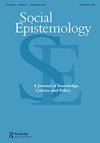Producing ME/CFS in Dutch Newspapers. A Social-Discursive Analysis About Non/credibility
IF 2
2区 哲学
Q1 HISTORY & PHILOSOPHY OF SCIENCE
引用次数: 0
Abstract
ABSTRACT Myalgic Encephalomyelitis (ME)/Chronic Fatigue Syndrome (CFS) is a highly contested illness. This paper analyzes the discursive production of knowledge about, and recognition of ME/CFS. By mobilizing insights from social epistemology and epistemic injustice studies, this paper reveals how actors, through their social-discursive practices, attribute to establishing, sustaining, and disregarding their own and others’ epistemological position. In focusing on the case of the Dutch newspaper reporting about ME/CFS, this paper shows that the debate about this condition predominantly revolves around the ways in which people who make truth claims are represented. In being portrayed as gendered, affectatious, formerly very able, fanatical, or benevolent, people with ME/CFS are constructed as non-/credible. In the debate about what causes ME/CFS, by contrast, the production of non-/credible knowledge focuses more on the content of epistemic positions. Actors in this debate argue that they know the (clear) causes for the illness, something which functions as a discursive strategy to establish and enhance their credibility. This paper contends, however, that since this discursive demarcation of causes is consistently infused with uncertainty – with multi-interpretability, with diffuse explanations, and absence of current knowledge – the credibility of these actors’ epistemic position is undercut rather than established.在荷兰报纸上制作脑脊髓炎/慢性疲劳综合征。关于不可信的社会话语分析
摘要肌痛性脑脊髓炎(ME)/慢性疲劳综合征(CFS)是一种备受争议的疾病。本文分析了关于脑脊髓炎/慢性疲劳综合征的知识的话语生成和认知。通过调动社会认识论和认识论不公正研究的见解,本文揭示了行动者如何通过其社会话语实践,归因于建立、维持和无视自己和他人的认识论地位。通过关注荷兰报纸报道脑脊髓炎/慢性疲劳综合征的案例,本文表明,关于这种情况的辩论主要围绕着声称真相的人的代表方式展开。患有脑脊髓炎/慢性疲劳综合征的人被描绘成性别化的、做作的、以前非常能干的、狂热的或仁慈的,被构造成不可信的。相比之下,在关于是什么导致脑脊髓炎/慢性疲劳综合征的争论中,不可信知识的产生更多地集中在认识立场的内容上。这场辩论中的参与者辩称,他们知道疾病的(明确)原因,这是一种建立和提高可信度的话语策略。然而,本文认为,由于这种原因的话语划分始终充满了不确定性——具有多重可解释性、分散的解释和缺乏当前知识——这些参与者的认识立场的可信度被削弱而不是建立起来。
本文章由计算机程序翻译,如有差异,请以英文原文为准。
求助全文
约1分钟内获得全文
求助全文
来源期刊

Social Epistemology
Multiple-
CiteScore
2.60
自引率
17.60%
发文量
60
期刊介绍:
Social Epistemology provides a forum for philosophical and social scientific enquiry that incorporates the work of scholars from a variety of disciplines who share a concern with the production, assessment and validation of knowledge. The journal covers both empirical research into the origination and transmission of knowledge and normative considerations which arise as such research is implemented, serving as a guide for directing contemporary knowledge enterprises. Social Epistemology publishes "exchanges" which are the collective product of several contributors and take the form of critical syntheses, open peer commentaries interviews, applications, provocations, reviews and responses
 求助内容:
求助内容: 应助结果提醒方式:
应助结果提醒方式:


